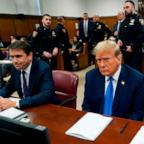John and Elizabeth Edwards on 'This Week'
Dec. 31, 2006 — -- The latest candidate for president, John Edwards, kicked off his campaign this week by helping with Katrina recovery in New Orleans, completing a round of interviews on the morning shows and going on a cross-country tour of town halls to overflow crowds in the key states of Iowa, New Hampshire and Nevada. He spoke to This Week's George Stephanopoulos about Iraq, same-sex unions and podcasts.
Stephanopoulos began by asking Edwards if he thought the execution of Saddam Hussein would make any difference on the ground in Iraq.
Edwards: Not a lot. I think given the situation on the ground, I think most of the driving force in the situation on the ground is the Sunni-Shia, something that's been going on for centuries, the Sunnis feeling on the outside of the government, not having any power.
I don't see this having much influence.
Stephanopoulos: Mrs. Edwards, you grew up on a military family.
Elizabeth Edwards: I did.
Stephanopoulos: Your father in the Navy, he served in Vietnam.
Elizabeth Edwards: World War II, Korea and Vietnam.
Stephanopoulos: All three.
Elizabeth Edwards: Yes.
Stephanopoulos: How does that affect how you view Iraq?
Elizabeth Edwards: I have an enormous amount of sympathy for the families who have men and women who are serving there and, as I say, I think about them a lot. Cate was coming home…
Stephanopoulos: Your daughter.
Elizabeth Edwards: Our 24-year-old daughter was coming home for Christmas and was at the airport on Christmas Eve or the evening of the 23rd and there were soldiers getting on planes to go to Iraq on December 23.
It's just hard to not have your heart go out to these people and it makes me really sad that we say we're going to stay until we win or whatever, but nobody tells us what that is, and I think about those families thinking, "So when do we get our boys, our sons, our daughters home and what are they there for?"
There was a young boy who talked during the 2004 campaign who had served in Afghanistan and Iraq and he said, "When I went to Afghanistan, we knew what we were doing. When we went to Iraq, we didn't."
Edwards: But when you're in a military family, emotionally, can you afford to question what's going on?
Elizabeth Edwards: Yes, we can. I had a lot of angst about whether I could protest the Vietnam War after my father had been in it, after I knew so many people who had been injured, because a lot of them came to Japan where we were stationed at the time.
But I realized that you can still support the troops without supporting the policy and I think that's the way a lot of Americans feel right now. I don't think there's anybody who doesn't feel great pride in what the American military men and women have done and the effort they have put in, but it doesn't mean that you have to support the policy.
Stephanopoulos: It doesn't appear that President Bush is going to take your advice to pull out 40 or 50,000 troops.
Edwards: No.
Stephanopoulos: Just based on the last four years…
Edwards: No, he never has and he's continuing on the wrong course.
Stephanopoulos: And that likely means that the next president, like you say, we can't know for sure, but the next president is still going to be dealing with a substantial number of American troops in Iraq, perhaps for many years.
Edwards: Yes, and, hopefully, the next president will understand that what we've been doing is not working. And I actually, myself, believe that this idea of surging troops, escalating the war, what Senator McCain has been talking about, what I would call now the McCain doctrine, it's…
Stephanopoulos: McCain doctrine.
Edwards: McCain doctrine. He's been the most prominent spokesperson for this for some time.
Stephanopoulos: The general election is starting early.
Edwards: I'm just telling you it's his thing and I know John McCain very well, he and I are friends, but I think he's dead wrong about this.
Stephanopoulos: I've been watching you over the last few days as you've started this campaign and the word "morality" comes up a lot, particularly in foreign policy. But I wonder if one of the lessons of the last few years is that it's dangerous for America to put its power behind moral crusades and unleashing forces we may not be able to control and entangling us in conflicts we may not be able to solve.
Edwards: Well, it depends on what your definition of a moral cause is and what moral leadership is. The kind of things that I'm talking about I think there would be universal support for, doing something about the genocide in Sudan and Darfur, doing something…
Stephanopoulos: Do you think it takes American troops?
Edwards: No. Actually, my own view is that putting American troops on the ground in Darfur would probably be a mistake. It would probably do more damage than good.
But there are obvious things we can do in Sudan. The Janjaweed militia have air support from the Sudanese government. We could enforce the no-fly zone. We ought to be much tougher about imposing sanctions on the Sudanese government.
But the genocide, global poverty, the spread of HIV/AIDS, the atrocities that are occurring in northern Uganda, there are a whole range of places that America would have basically universal support if we showed some leadership.




